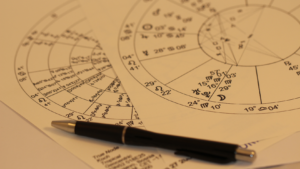Horoscopic Astrology

This expression began to be used relatively frequently in the Western astrological world in the context of the systematic recovery (including retranslation and even some unpublished translations into English) of the works of ancient astrologers from Europe and the Middle East, which began in the 1990s.
“Horoscopic astrology” serves to distinguish astrology based on the exact moment and location of a person’s birth from the astrology of omens from Babylonian times, in which messages or warnings from the gods to the king and kingdom were sought in the configurations of the stars.
This means that, in earlier times, astrological observations had a collective character.
With the introduction of horoscopic astrology, every individual came to have (or could have) their own astrological chart based on the moment and location of their birth.
On the other hand, astrology lost its religious and purely divinatory character and began to organize itself in the form of a science, that is, around relatively precise principles and rules of interpretation.
The word “horoscope,” which can presently mean a popular section of newspapers with “predictions” for the 12 signs of the Zodiac or, alternatively, the individual astrological chart, has a very precise etymological origin. It derives from the Greek word “horoscopus” (ὡρόϲκοποϲ), which literally means “the one who marks the hour” or, more specifically, the “ascendant” degree, that is, the zodiacal degree where the local horizon and the ecliptic intersect.